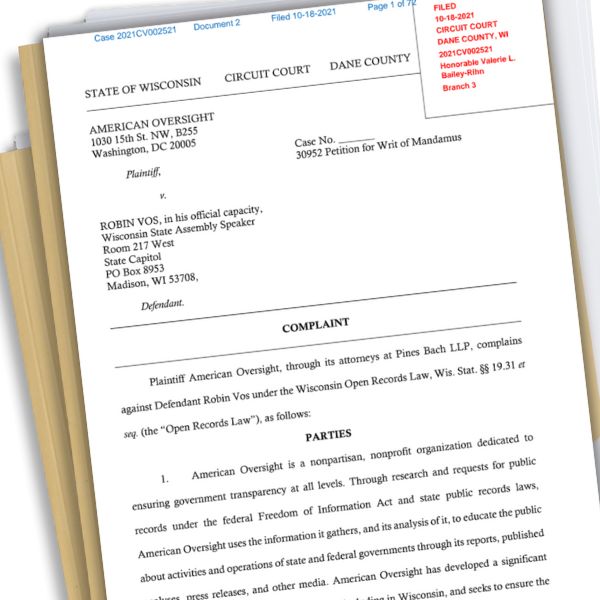
American Oversight Files Brief in Opposition to Speaker Vos’ Attempt to Block Release of Records
On April 12, American Oversight asked the court to deny Wisconsin Assembly Speaker Vos’ belated motion to keep private more than 20,000 public records that had been released to American Oversight days before.

Last week, American Oversight obtained more than 20,000 previously deleted records as part of litigation related to the Wisconsin Assembly’s partisan investigation of the 2020 election. But two days after the office of Assembly Speaker Robin Vos released the documents, Vos’ counsel asked the court to keep those records private — yet another effort to avoid and delay transparency, and an action that American Oversight on Tuesday challenged in court.
After business hours on Friday, April 8, Vos’ counsel filed a motion claiming that the records it had already released were confidential and asking the court to prohibit their release.
The documents included communications with prominent supporters of the stolen-election lie and information about lead investigator Michael Gableman’s contract extensions. The documents belonged to Vos, who, under pressure from former President Donald Trump, had ordered the probe in May 2021.
American Oversight on Tuesday filed a brief in opposition to what amounts to a flawed and meritless motion. Not only was Vos’ motion improper and untimely, it relies entirely on a plainly incorrect legal argument.
American Oversight’s brief argues that the defendants’ “unjustifiably expansive” interpretation of the law, if adopted, “would lead to the evisceration of the [Wisconsin] Open Records law’s application to the legislative branch.”
Moreover, Vos failed to raise the issue of confidentiality during the court hearing on April 7, the day after the records were released, or in previous related filings. “In short, at the time Defendant produced records on April 6, Defendant had never asked Plaintiff to keep those records confidential (or taken steps to restrict their use in any other way),” American Oversight’s brief states.
American Oversight asked the court to reject Vos’ motion, arguing that “belated second thoughts about the production do not justify the extraordinary and unsupported relief he is seeking.”
After filing our brief, American Oversight resumed processing and publishing the full production, which is available here.

